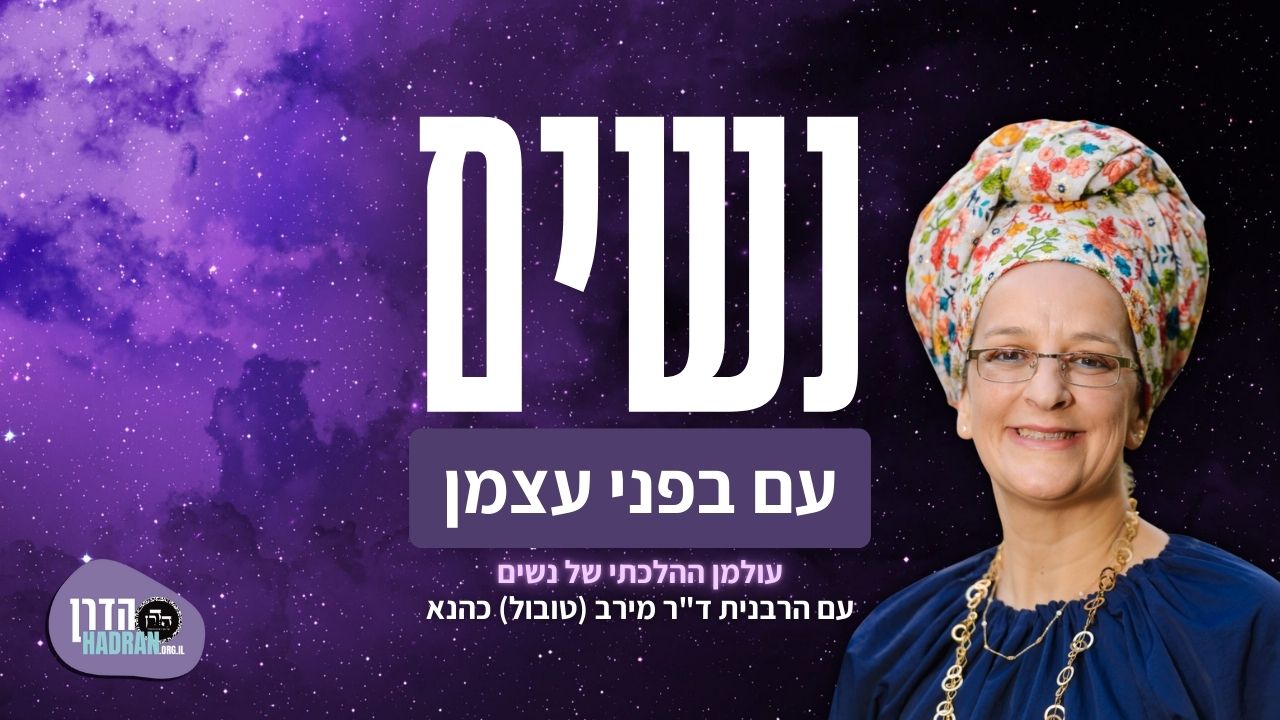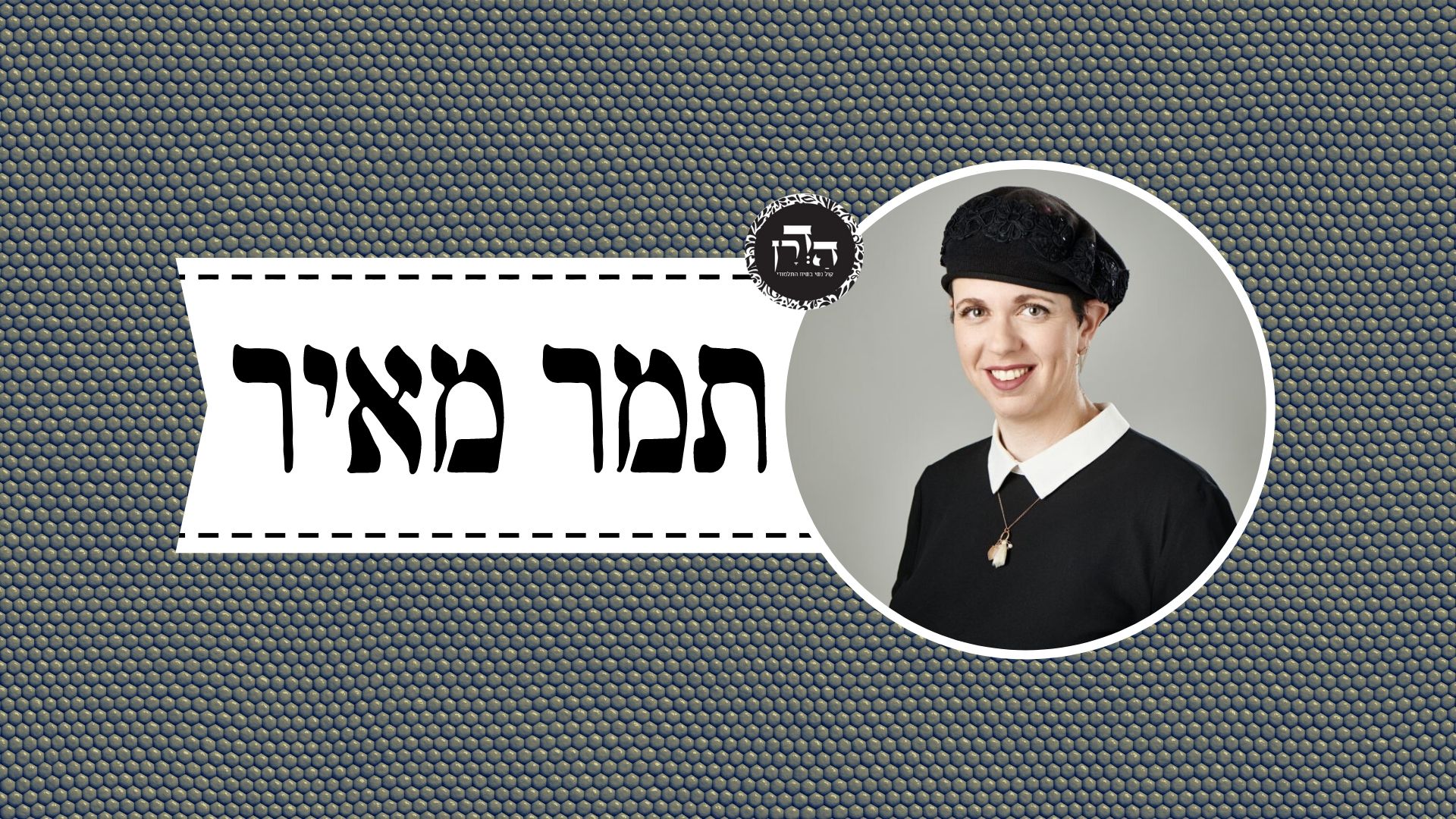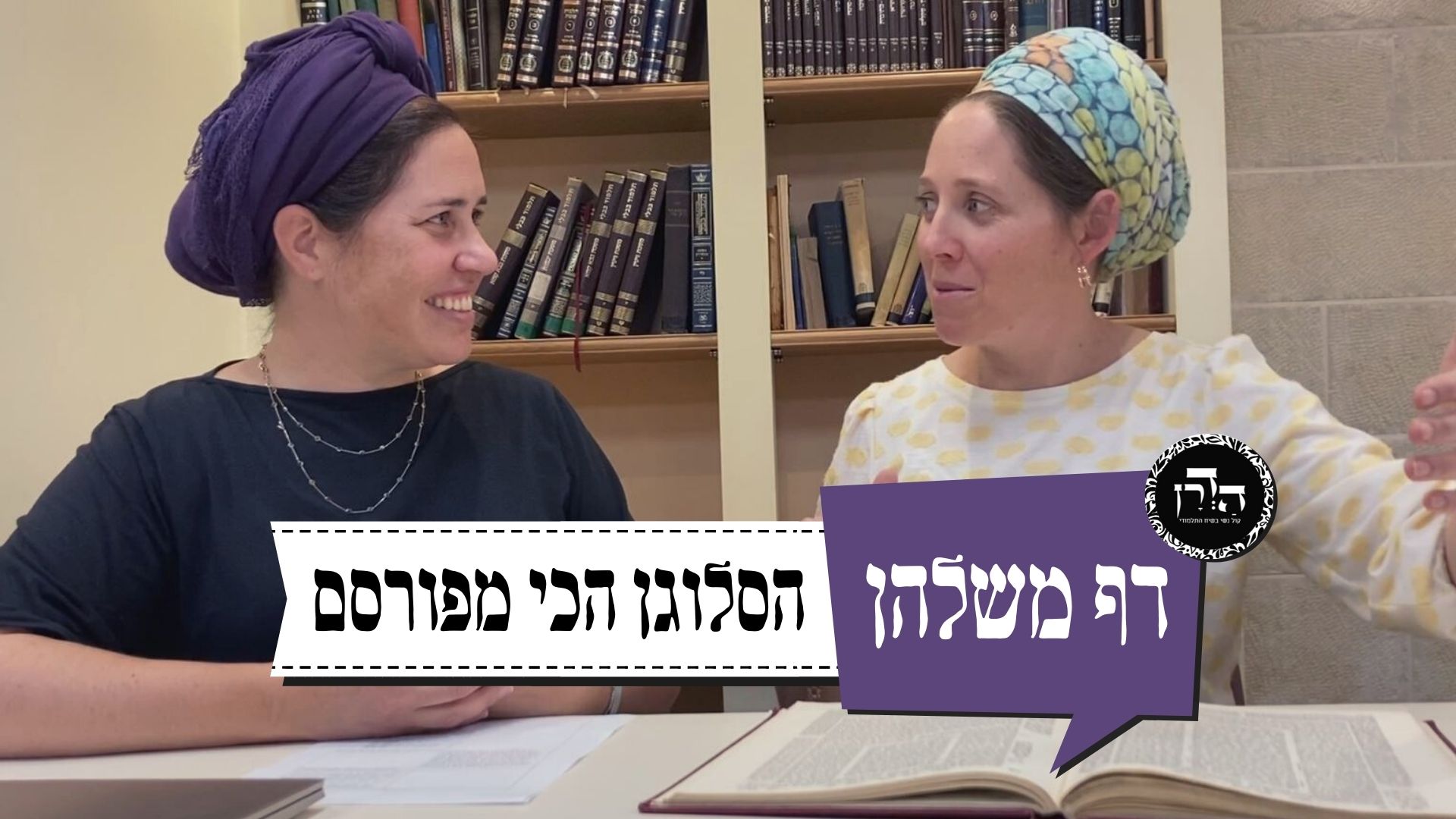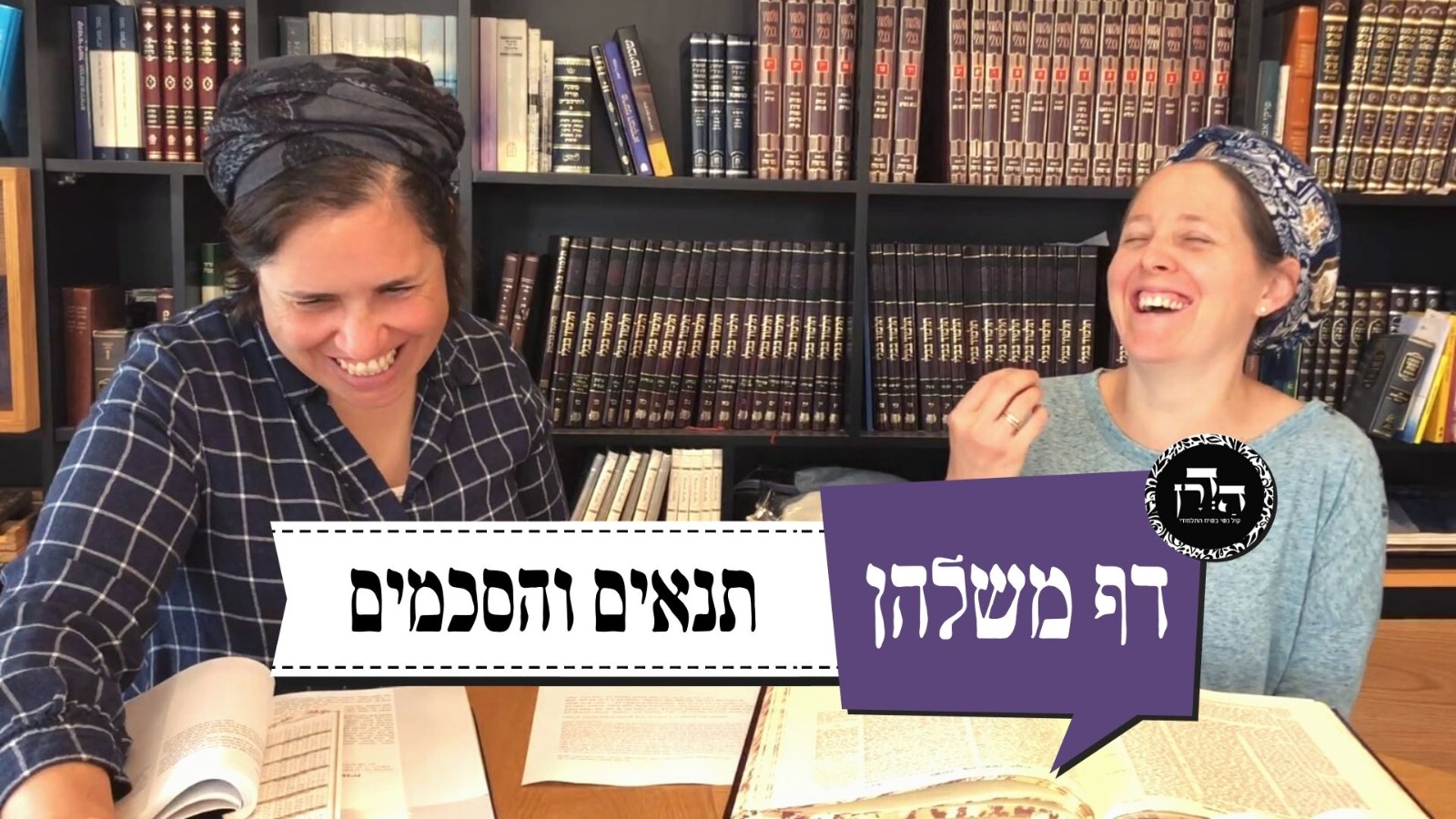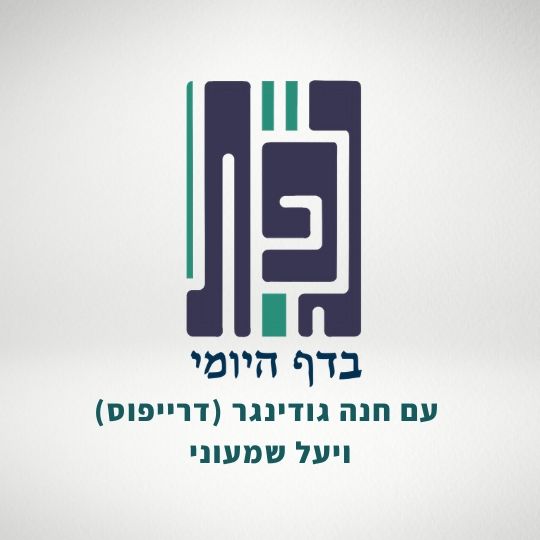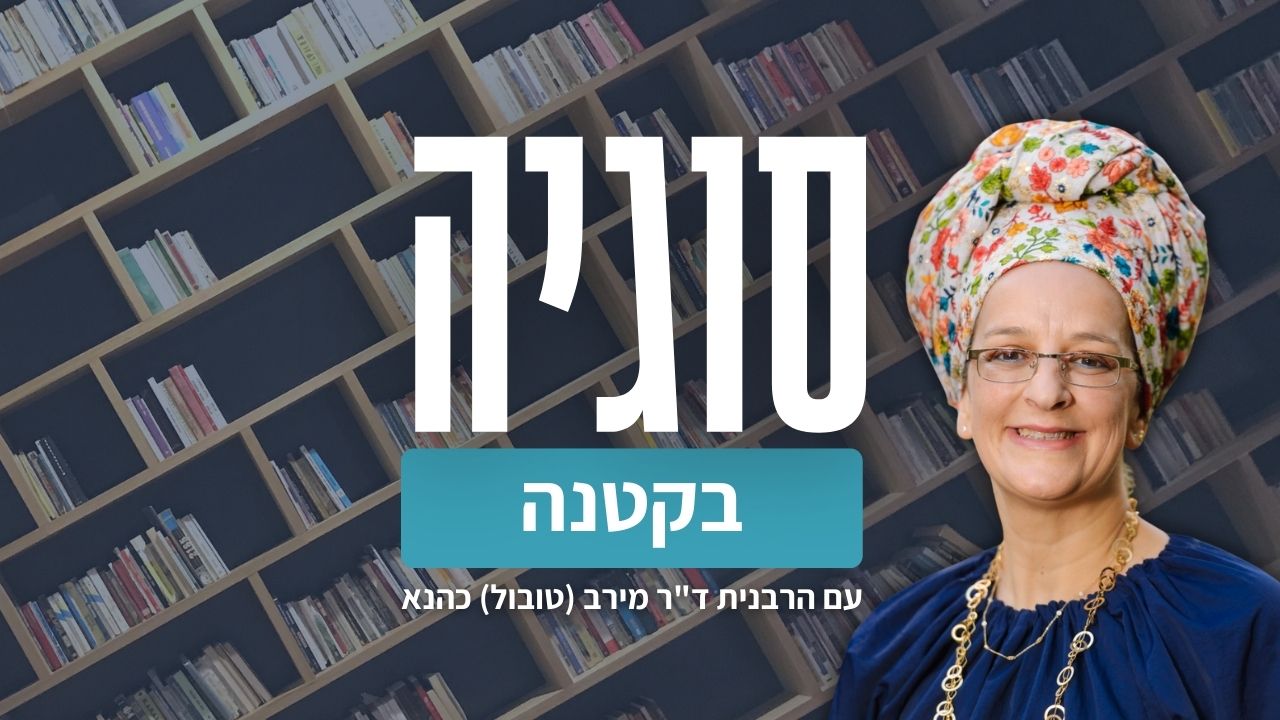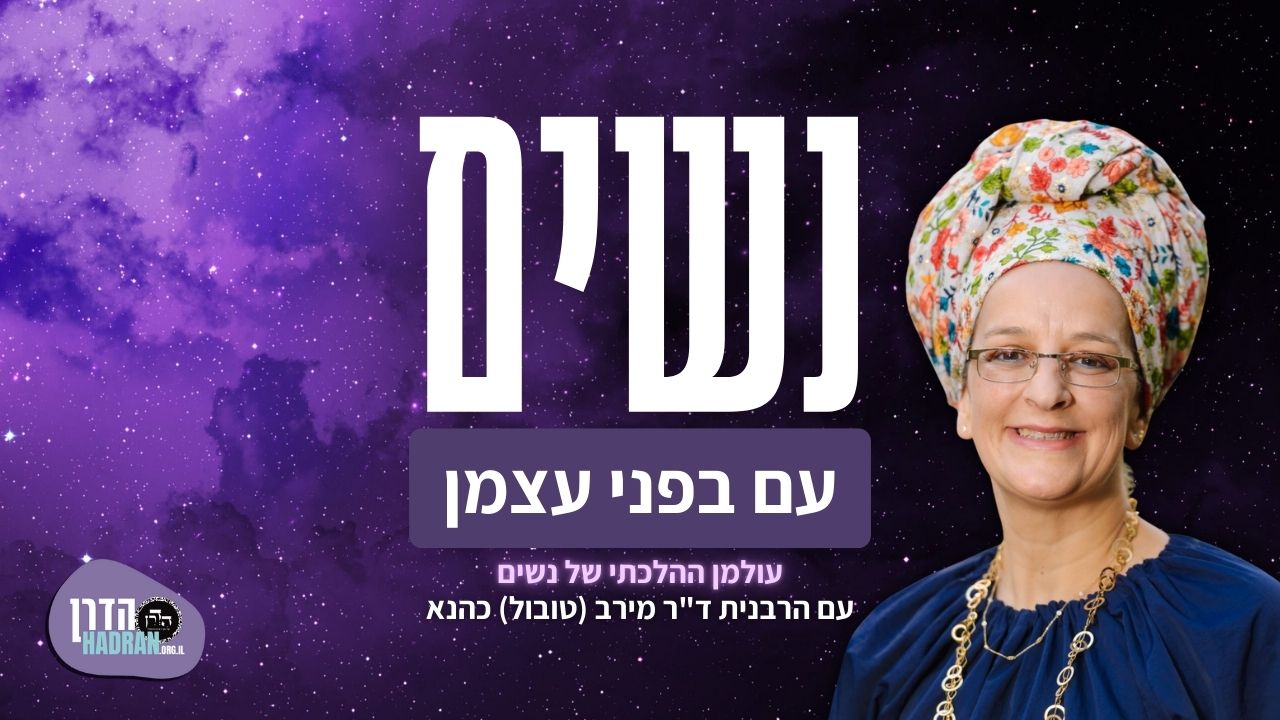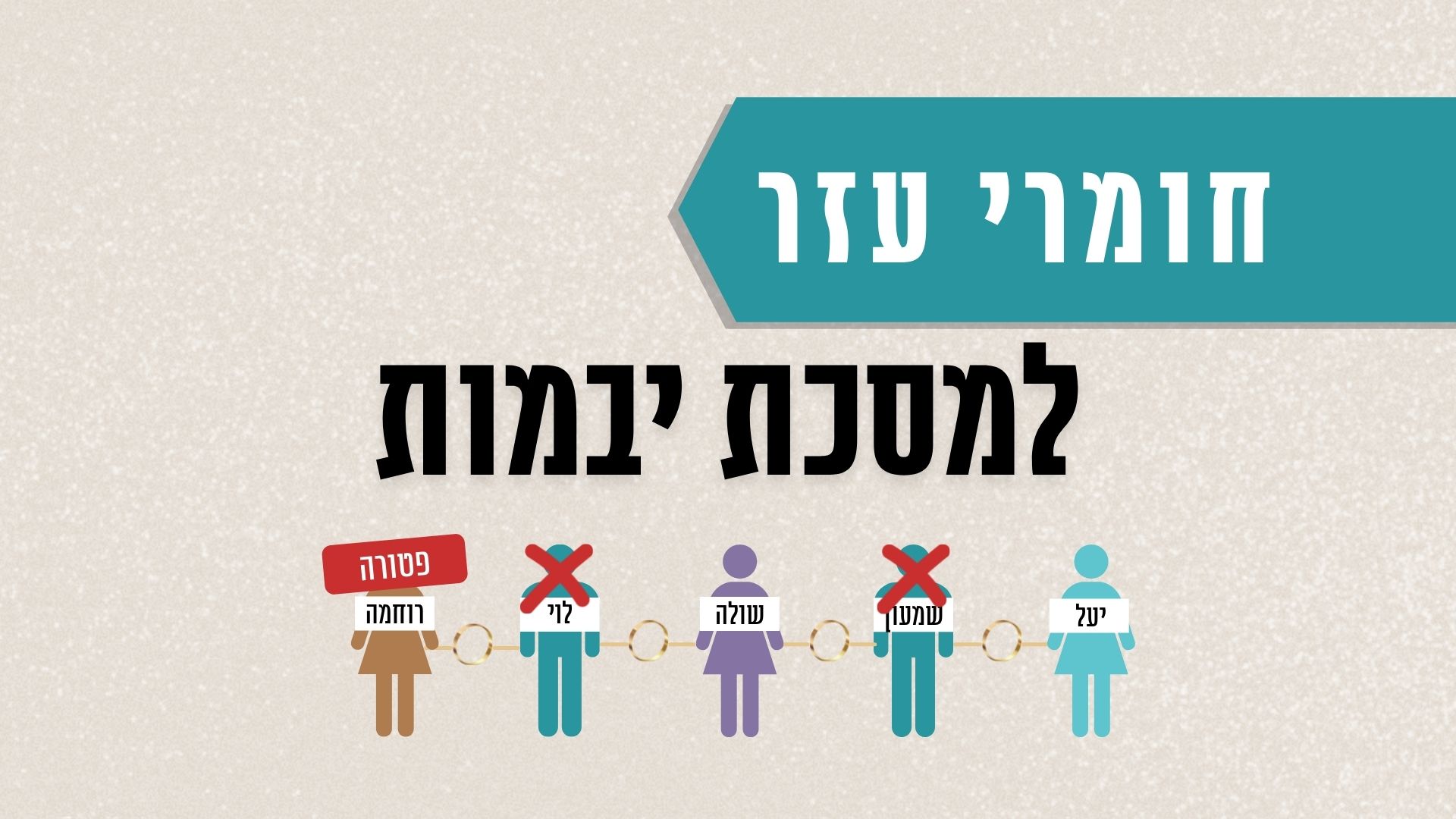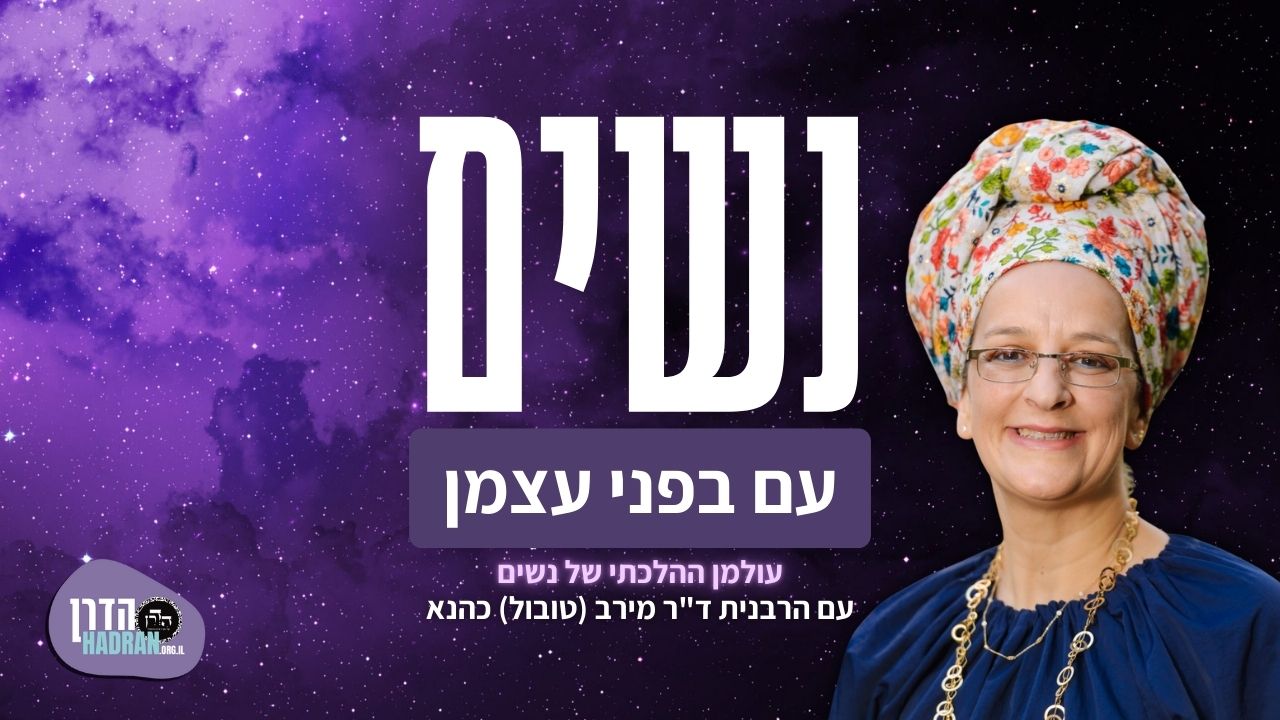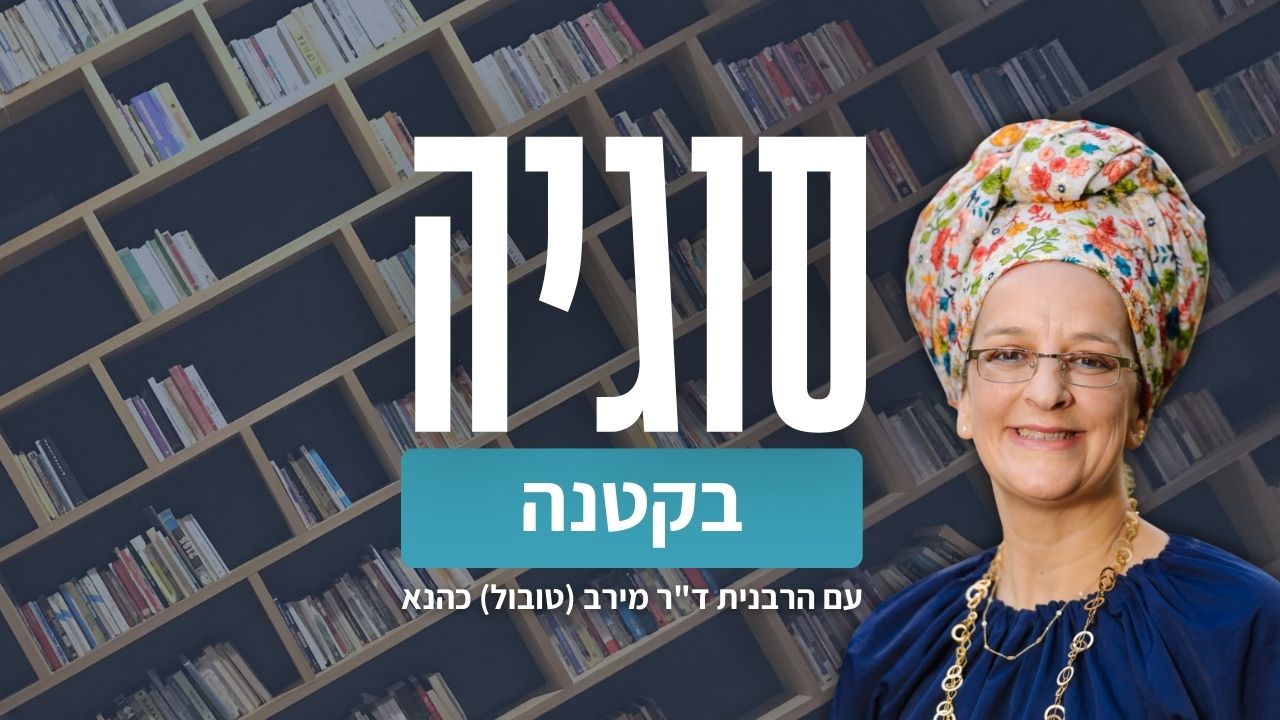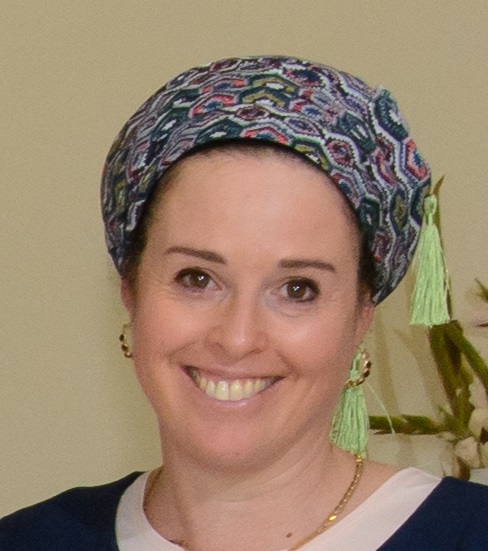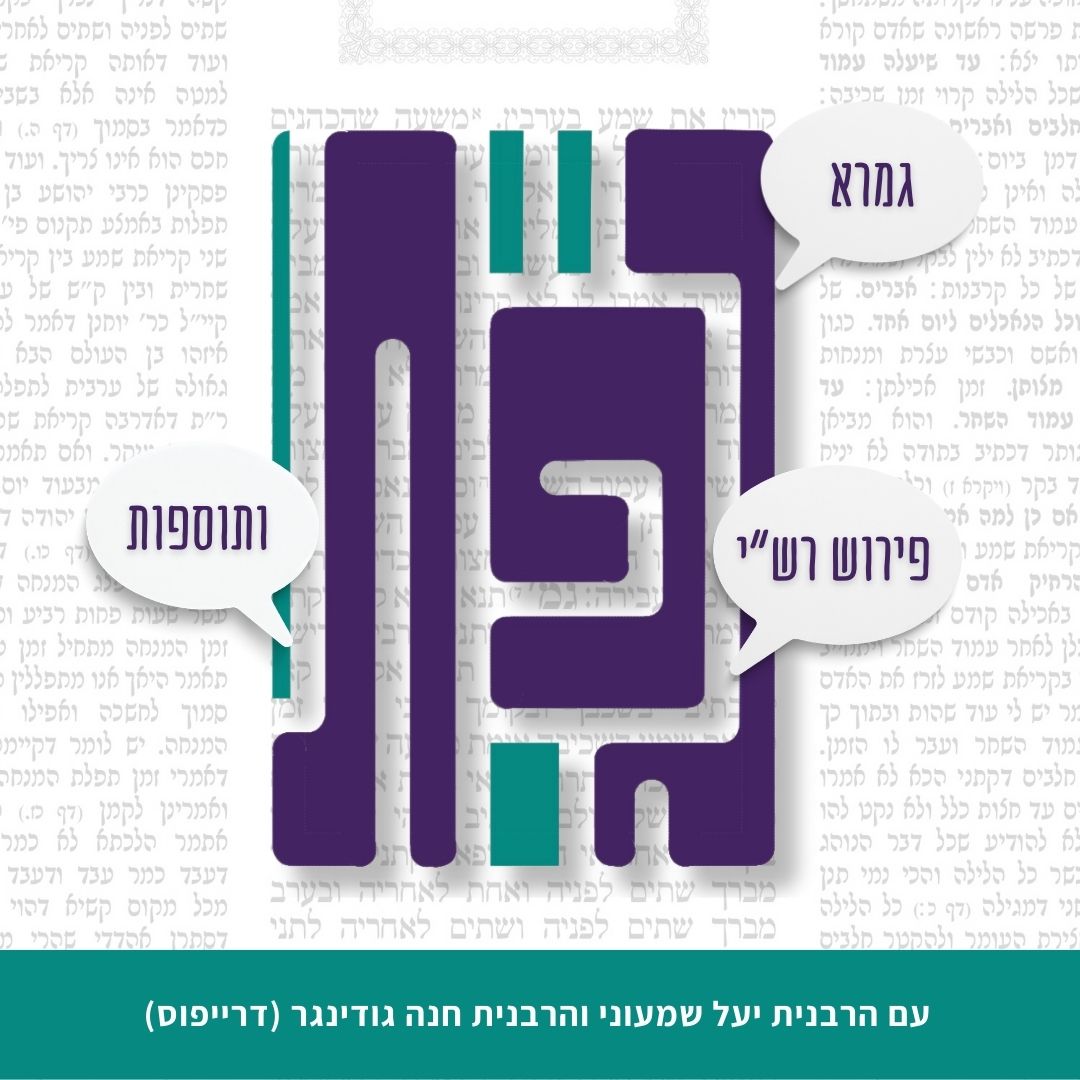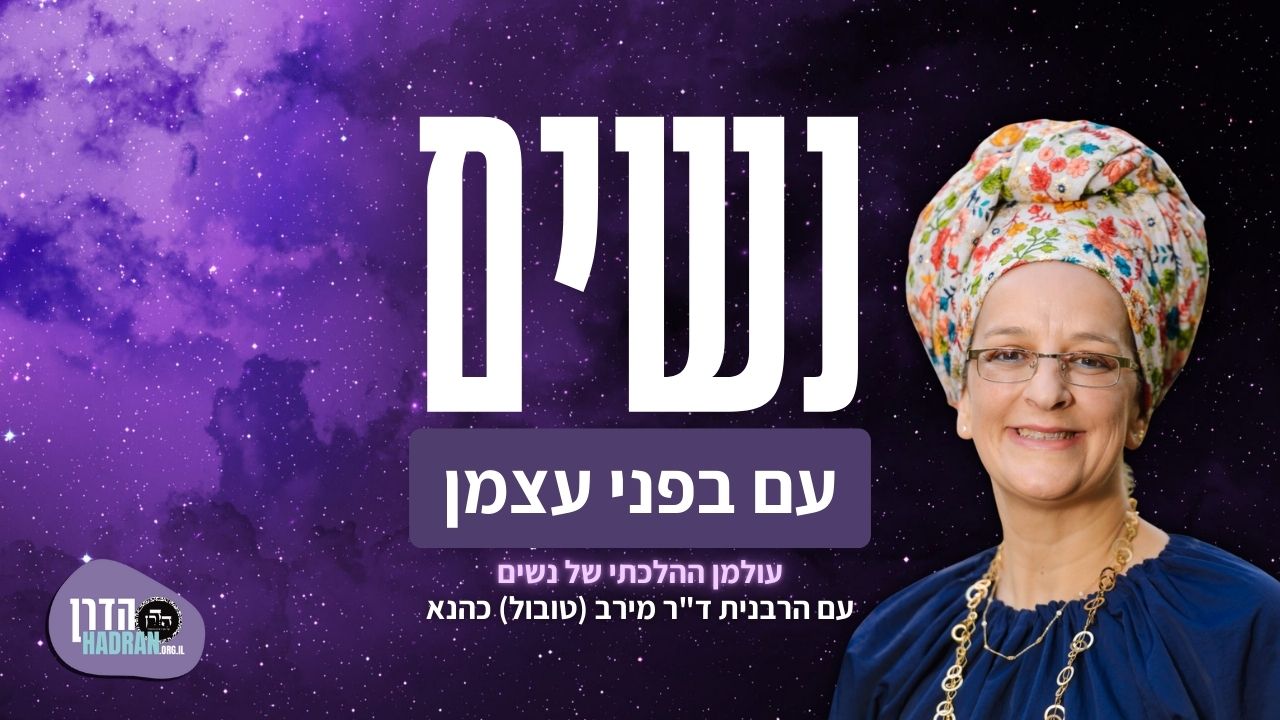רבא מצמצם את המחלוקת בין רב ור’ יוחנן בקשר לדין מעילה באפר שבתפוח וגם ההלכה שמופיעה בברייתא בקשר לתשלומי מעילה על חטאת שנתכפרו בעלים באחר. המשנה מונה דברים שקרבים על המזבח שאין להם מתירין ומגדיר את ההבדלים בינם לבין דברים שקרבים שיש להם מתירין שדנו בהם במשיות הקודמות. המשנה מונה חמש חטאות מתות ומחלקם לשתיים שבשניים מתוכם יש הבחנה מסויימת שאין בשאר.

כלים
הלימוד החודש מוקדש לרפואת פיליס הכט, גיטל פעשא בת מאשה רחל על ידי חברותיה הרבות שאוהבות ומעריכות אותה.
כלים
העמקה
רוצה להבין מה באמת קורה מתחת לפני השטח של הסוגיה?
שיעורים, פודקאסטים והרחבות של מיטב המורות שלנו יפתחו לך עוד זוויות וכיווני חשיבה.
חדשה בלימוד הגמרא?
זה הדף הראשון שלך? איזו התרגשות עצומה! יש לנו בדיוק את התכנים והכלים שיעזרו לך לעשות את הצעדים הראשונים ללמידה בקצב וברמה שלך, כך תוכלי להרגיש בנוח גם בתוך הסוגיות המורכבות ומאתגרות.
פסיפס הלומדות שלנו
גלי את קהילת הלומדות שלנו, מגוון נשים, רקעים וסיפורים. כולן חלק מתנועה ומסע מרגש ועוצמתי.
מעילה י
וְסֵיפָא רַבָּנַן?! אָמַר רַב גְּבִיהָא דְּבֵי כְתִיל לְרַב אָשֵׁי, הָכִי אָמַר אַבָּיֵי: רֵישָׁא רַבִּי שִׁמְעוֹן וְסֵיפָא רַבָּנַן.
And the latter clause of the baraita is in accordance with the opinion of the Rabbis, who maintain that a sin offering that became lost is left to die only if it was found after its replacement had already been sacrificed. Rav Geviha of Bei Katil likewise said to Rav Ashi that this is what Abaye said: The first clause of that baraita is in accordance with the opinion of Rabbi Shimon and the latter clause is in accordance with the opinion of the Rabbis.
אָמַר רָבָא: הַכֹּל מוֹדִים שֶׁאִם נֶהֱנָה מִבְּשַׂר קׇדְשֵׁי קָדָשִׁים שֶׁנִּטְמָא קוֹדֶם זְרִיקָה, וּמֵאֵימוּרַי קָדָשִׁים קַלִּין לְאַחַר שֶׁהֶעֱלָן, דְּפָטוּר.
§ Rava says: With regard to the dispute between Rav and Rabbi Yoḥanan, everyone concedes that if one derived benefit from meat of an offering of the most sacred order that had become ritually impure before the sprinkling of the blood on the altar, or from the sacrificial portions, such as the fats of offerings of lesser sanctity, after they have been brought up to the altar, that he is not liable for misuse of consecrated property, and is exempt from repayment or bringing an offering. The reason is that although in both cases the meat must be burned, this burning is not considered part of the Temple service.
פְּשִׁיטָא, מַאי קָא מַפְסֵיד?
The Gemara asks: Isn’t this ruling obvious? What loss did the one who derived benefit cause to Temple property? The impure meat of an offering of the most sacred order is unfit for the altar and may not be eaten by the priests, and once the portions of offerings of lesser sanctity have been placed on the altar no further service is performed with them.
מַהוּ דְּתֵימָא בְּשַׂר קׇדְשֵׁי קָדָשִׁים שֶׁנִּטְמָא – אִית לֵיהּ מִצְוַת שְׂרֵיפָה לְכֹהֲנִים, אֵימוּרֵי קָדָשִׁים קַלִּין – אִיכָּא מִצְוָה לְהַפּוֹכֵי בְּצִינּוֹרָא, קָא מַשְׁמַע לַן דְּלָא.
The Gemara answers that Rava’s statement is necessary, lest you say with regard to meat of an offering of the most sacred order that had become ritually impure: There is a mitzva for the priests to burn it; and lest you say with regard to the sacrificial portions from the fats of offerings of lesser sanctity: There is a mitzva to turn them with a fork [betzinnora] while they are on the altar, so that they will burn more evenly and quickly. Consequently, one who derives benefit from them should be liable for misuse. Rava therefore teaches us that there is no liability for misuse, as the mitzva to burn them or turn them is not considered part of the sacrificial rite.
אָמַר רָבָא: הָא דְּאָמְרַתְּ ״כְּבָר קָרְבָה חַטָּאת יֵלְכוּ לְיָם הַמֶּלַח״, הָנֵי מִילֵּי דְּאִתְיְדַע לֵיהּ קַמֵּי כַּפָּרָה, אֲבָל לְאַחַר כַּפָּרָה – יִפְּלוּ לִנְדָבָה. מַאי טַעְמָא? אֵין מַפְרִישִׁין מִתְּחִלָּה לְאִיבּוּד.
Rava said, in explanation of the above baraita: This halakha that you say, that if his sin offering has already been sacrificed, then the money is cast into the Dead Sea, this statement applies only if his prohibited benefit was made known to him before the atonement, i.e., before the sacrifice of the animal. In such a case, he could have added his money to the value and purchased a better animal for his offering. But if it became known to him only after the atonement, i.e., the sacrifice of the animal, the money is not cast into the Dead Sea. Instead, it is allocated for communal gift offerings. What is the reason? There is a principle that one does not separate money or an offering from the outset in order for it to be lost or destroyed by being cast into the Dead Sea.
מַתְנִי׳, הַקּוֹמֶץ, וְהַלְּבוֹנָה, וְהַקְּטוֹרֶת, וּמִנְחַת כֹּהֲנִים, וּמִנְחַת כֹּהֵן מָשִׁיחַ, וּמִנְחַת נְסָכִים – מוֹעֲלִין בָּהֶם מִשֶּׁהוּקְדְּשׁוּ.
MISHNA: The mishna lists sacrificial items that are consumed in their entirety on the altar and of which the priests have no share. One is liable for misuse of the handful taken from the meal offering, and the frankincense burned with the handful on the altar, and the incense burned each day on the golden altar in the Sanctuary, and the meal offering of priests, from which a handful is not taken but which is burned in its entirety, and the meal offering of the anointed priest, i.e., the High Priest, and the meal offering sacrificed with the libations that accompany offerings. In all these cases, one is liable for misuse from the moment that they were consecrated through declaration.
קִדְּשָׁן בִּכְלִי – הוּכְשַׁר לִיפָּסֵל בִּטְבוּל יוֹם, וּבִמְחוּסַּר כִּפּוּרִים, וּבְלִינָה, וְחַיָּיבִין עָלָיו מִשּׁוּם נוֹתָר, וּמִשּׁוּם טָמֵא וּפִיגּוּל אֵין בָּהּ.
Once one consecrated them by placing them in the appropriate service vessel, each was rendered susceptible to disqualification for sacrifice through contact with one who immersed in a ritual bath that day, and through contact with one who has not yet brought an atonement offering, and through its blood being left overnight, and one is liable to receive karet for eating it, due to violation of the prohibition of notar, and due to the prohibition of partaking of it while ritually impure; but there is no liability for piggul in each of these cases.
זֶה הַכְּלָל: כׇּל שֶׁיֵּשׁ לוֹ מַתִּירִין – אֵין חַיָּיבִין עָלָיו מִשּׁוּם פִּיגּוּל וְנוֹתָר וְטָמֵא עַד שֶׁיַּקְרִיבוּ מַתִּירִין.
This is the principle that applies to piggul: With regard to any consecrated item that has permitting factors, i.e., there is another item whose sacrifice renders it permitted for consumption by the altar or by an individual, one is not liable due to violation of the prohibition of piggul, and the prohibition of notar, and the prohibition of partaking of it while ritually impure, until they sacrifice the permitting factors.
וְכֹל שֶׁאֵין לוֹ מַתִּירִין, כֵּיוָן שֶׁקִּידֵּשׁ בִּכְלִי – חַיָּיבִין עָלָיו מִשּׁוּם נוֹתָר וְטָמֵא, וּפִיגּוּל אֵין בָּהּ.
And with regard to any item that does not have permitting factors, e.g., the handful and the frankincense, as they render other items permitted whereas no other items are needed to render them permitted, once one sanctified them in the appropriate service vessel, one is liable to receive karet for eating it, due to violation of the prohibition of notar, and the prohibition of partaking of it while ritually impure; but there is no liability for piggul in those cases.
גְּמָ׳ מְנָא הָנֵי מִילֵּי? דְּתָנוּ רַבָּנַן: יָכוֹל אֵין חַיָּיבִין מִשּׁוּם טוּמְאָה אֶלָּא בְּדָבָר שֶׁיֵּשׁ לוֹ מַתִּירִין?
GEMARA: The mishna teaches that one is liable for the prohibition of notar and the prohibition of eating an item while ritually impure, both with regard to items that have permitting factors and items that do not have permitting factors. The Gemara asks: From where are these matters derived? The Gemara answers that this is as the Sages taught in a baraita: One might have thought that one is liable due to partaking of sacrificial food in a state of ritual impurity only with regard to an item that has permitting factors.
וְדִין הוּא: וּמָה פִּיגּוּל שֶׁהוּא בִּידִיעָה אַחַת, וְקׇרְבָּנוֹ קָבוּעַ, וְלֹא הוּתַּר מִכְּלָלוֹ – אֵין חַיָּיבִין אֶלָּא עַל דָּבָר שֶׁיֵּשׁ לוֹ מַתִּירִין,
The baraita continues: And this is a logical inference: If with regard to piggul, which renders one who eats it unwittingly liable through one awareness, i.e., for one to be liable to bring a sin offering it is enough for him to become aware after the fact that he had sinned unwittingly, and its offering for one who eats it unwittingly is fixed, and there are no circumstances in which its general prohibition was permitted, i.e., it is never permitted to eat piggul, and yet one is liable due to the prohibition of partaking of piggul only for an item that has permitting factors, the same should certainly apply to ritual impurity.
טוּמְאָה, שֶׁהִיא בִּשְׁתֵּי יְדִיעוֹת, וְקׇרְבָּנוֹ עוֹלֶה וְיוֹרֵד, וְהוּתְּרָה מִכְּלָלָהּ – אֵינוֹ דִּין שֶׁלֹּא יְהֵא חַיָּיב אֶלָּא עַל דָּבָר שֶׁיֵּשׁ לוֹ מַתִּירִין?!
The Gemara elaborates: Then with regard to ritual impurity, where one is liable only in a case of two awarenesses, i.e., one is liable only if he was aware of his impurity before eating the meat, and then forgot and ate, and afterward again became aware of his impurity; and its offering to atone for this transgression is a sliding-scale offering, which varies according to the offender’s financial status; and there are circumstances in which its general prohibition was permitted to the community, as communal offerings are sacrificed in the Temple in a state of impurity, under certain circumstances; is it not right that one should be liable for violating the prohibition of partaking of the meat while ritually impure only for an item that has permitting factors?
תַּלְמוּד לוֹמַר: ״אֱמֹר אֲלֵהֶם לְדֹרֹתֵיכֶם כׇּל אִישׁ אֲשֶׁר יִקְרַב מִכׇּל זַרְעֲכֶם וְגוֹ׳״ – בְּכׇל הַקֳּדָשִׁים הַכָּתוּב מְדַבֵּר. יָכוֹל יְהוּ חַיָּיבִין עֲלֵיהֶן מִיָּד? תַּלְמוּד לוֹמַר: ״אֲשֶׁר יִקְרַב״.
Therefore, the verse states: “Say to them: Anyone of all your seed throughout your generations, that approaches the sacred items, which the children of Israel consecrate to the Lord, while his impurity is on him, that soul shall be cut off from before Me: I am the Lord” (Leviticus 22:3). The verse, which deals with eating while ritually impure, is speaking of all the sacred items, whether or not they have a permitting factor. One might have thought that they should be liable for eating them immediately, as soon as they have been verbally consecrated, even before they have been placed into a service vessel. The verse states: “That approaches the sacred items.” This clause is puzzling, as it apparently leads to the unlikely conclusion that liability applies after one has touched the item.
אָמַר רַבִּי אֶלְעָזָר: וְכִי יֵשׁ נוֹגֵעַ שֶׁהוּא חַיָּיב?! הָא כֵּיצַד? כׇּל דָּבָר שֶׁיֵּשׁ לוֹ מַתִּירִין – אֵינוֹ חַיָּיב עַד שֶׁיִּקְרְבוּ מַתִּירִין, וְכׇל דָּבָר שֶׁאֵין לוֹ מַתִּירִין – אֵינוֹ חַיָּיב עַד שֶׁיִּקְדַּשׁ בִּכְלִי.
The baraita explains that Rabbi Elazar said: But is there a case of one who touches an item who is liable? Rather, how is this possible? The answer is that the phrase “approaches [yikrav] the sacred items” can also be understood as: The sacred items that are fit to be sacrificed [yikarev], and therefore with regard to any item that has permitting factors, one is not liable until the permitting factors have been sacrificed. And in the case of any item that does not have permitting factors, one is not liable until it is sanctified in a service vessel.
הַדְרָן עֲלָךְ חַטַּאת הָעוֹף
.
וְלַד חַטָּאת, וּתְמוּרַת חַטָּאת, וְחַטָּאת שֶׁמֵּתוּ בְּעָלֶיהָ – יָמוּתוּ,
MISHNA: This mishna, which also appears in tractate Temura, deals with the five sin offerings left to die. It is cited here because of its relevance to the halakhot of misuse. The mishna first mentions three of those offerings: The offspring of a sin offering, and an animal that is the substitute for a sin offering, whether or not the owners achieved atonement by means of another offering, and a sin offering whose owners have died before the offering was sacrificed, shall die.
וְשֶׁעִיבְּרָה שְׁנָתָהּ, וְשֶׁאָבְדָה וְנִמְצֵאת בַּעֲלַת מוּם, אִם מִשֶּׁכִּיפְּרוּ הַבְּעָלִים – תָּמוּת. וְאֵינָהּ עוֹשָׂה תְּמוּרָה, וְלֹא נֶהֱנִין וְלֹא מוֹעֲלִין.
And the other two sin offerings left to die are the sin offering whose year since birth passed and is therefore unfit for sacrifice, and a sin offering that was lost and when it was found it was blemished, with regard to which the halakhot are as follows: If the sin offering was found after the owner achieved atonement through the sacrifice of another animal as a sin offering, then the blemished animal shall die, and it does not render a non-sacred animal exchanged for it a substitute, as it is has neither inherent sanctity, which would make it fit for sacrifice on the altar, nor sanctity that inheres in its value. And one may not derive benefit from the found animal ab initio, but if he derived benefit from the animal he is not liable for its misuse.
